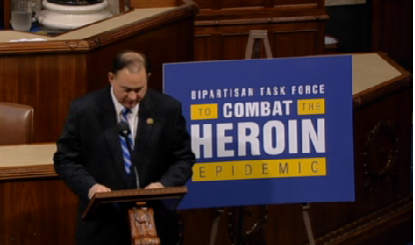
MANCHESTER, NH – Kriss Blevens was up before the sun on Wednesday to catch a 6:30 a.m. flight to Washington, D.C. It was going to take all the tricks in her cosmetic beauty bag to look fresh. After all, she would be running on near-empty.
Her plane was scheduled to take off just hours after wrapping up from the all-day Addiction Policy Forum festivities, held Jan. 5 at Southern New Hampshire University, and the sober soup-and-salad after party with her fellow peer counselors at Hope for New Hampshire Recovery.
There is no rest for the weary here in New Hampshire, the recovery warriors who, like Blevens, are taking all the detours and back roads they can find to secure recovery beds and after care placements for addicts coming to them to say they are ready for help.
They are like an underground railroad of rescue.
Blevens and her husband, Mark, are not victims of their circumstances. Rather, they are choosing to revisit the anguish, almost daily, of the world’s most unnatural pain — the loss of a child.
Blevens was called on by Guinta and Kuster to come to Washington, D.C., to share the story of her step-daughter, Amber, who died of a heroin overdose in 2014 at the age of 24.
What makes Amber’s death most tragic is that it was preventable.
If not for the bureaucratic hurdles, the lack of treatment options in New Hampshire, the bottomless pit of a criminal justice system that swallows addicts whole here, the gaps in mental health services, and the insurance debacle that persists, Amber might have had a fighting chance to find her way back.
New Hampshire Congressional representatives Frank Guinta and Annie Kuster, who have established a bi-partisan Heroin Task Force to Combat the Heroin Epidemic, invited Blevens and her husband to attend what is known as a Special Order. [The Special Order will be broadcast live on CSPAN starting around 8:15 p.m., and will be streamed on House.gov.]
It is the prelude to a hearing set for Jan. 12, for the STOP ABUSE Act, proposed by Guinta and co-sponsored by Kuster. The name of the bill is an acronym for Stop the Overuse Problem Already Becoming a Universal Substance Epidemic, also known as H.R. 3719, which you can read here. In short it aims to determine best practices for combating heroin abuse and getting people into recovery, and also would provide for “community-based coalition enhancement grants” to address local drug crises.

Kuster and Guinta were prepared to give testimony on Blevens’ behalf, along with 14 other Congressional colleagues, also sharing stories of constituents from their home states who have been affected by the heroin epidemic.
New Hampshire’s representatives mobilized the Congressional Heroin task force three months ago, based on the heart-wrenching stories they individually had been hearing from constituents in their respective districts.

“It seems everyone in New Hampshire has a personal story to tell about the devastating effect of heroin on our communities,” said Guinta. “I’m pleased to report real progress, as well as greater public awareness. But we still have a long way to go to solve a rapidly advancing health crisis.”
Both Guinta and Kuster spent Wednesday with Blevens, preparing for the Special Order testimony.
“The opioid epidemic has grown to historic proportions across America, with more Americans now dying each year from drug overdoses than car crashes,” said Congresswoman Kuster. “As co-chair of the Bipartisan Task Force to Combat the Heroin Epidemic, [Congressman Guinta and I] called this evening’s Special Order to highlight the urgent need to establish lasting solutions to the crisis, but also to combat the stigma that surrounds individuals suffering from substance use as well as their families. Behind the staggering numbers of drug fatalities are the valued lives of daughters and sons, mothers and fathers whose lives were precious and whose deaths inflicted terrible pain on loved ones,” Kuster said.
“By honoring Amber’s life, and by acknowledging the complexities of opioid use, it is my hope that we can better recognize the urgency behind bringing an end to this epidemic. I want to thank Kriss for allowing me to share Amber’s story this evening, and thank my colleagues from both sides of the aisle for joining me in tonight’s important discussion. I am hopeful that by continuing to work together we will be able to bring an end to the opioid epidemic across the country,” Kuster said.

Kuster and Guinta were among several dignitaries from New Hampshire who attended the Addiction Policy Forum on Jan. 5, including Gov. Maggie Hassan, Attorney General Joseph Foster, and U.S. Senators Jeanne Shaheen and Kelly Ayotte.
In addition, several presidential candidates showed up for the forum, including Jim Gilmore, John Kasich, Chris Christie, Carly Fiorina, and Jeb Bush.
Blevens joined the final panel of the day and introduced herself to the thinning crowd by summarizing the unexpected trajectory her life has taken since Amber’s death — the empowerment she has found through her connection to the state’s only community recovery center, and the importance of pressing on, through the pain of her loss and the frustration that persists, in the hope that she can help save someone else’s child.
Click the Soundcloud below to hear part of Blevens’ comments during the Addiction Policy Forum.
 You’re one click away! Sign up for our free eNewsletter and never miss another thing.
You’re one click away! Sign up for our free eNewsletter and never miss another thing.







